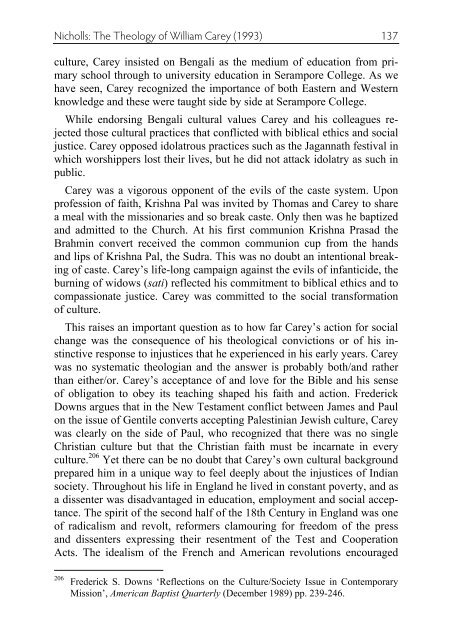Calvin and Missions - World Evangelical Alliance
Calvin and Missions - World Evangelical Alliance
Calvin and Missions - World Evangelical Alliance
You also want an ePaper? Increase the reach of your titles
YUMPU automatically turns print PDFs into web optimized ePapers that Google loves.
Nicholls: The Theology of William Carey (1993) 137<br />
culture, Carey insisted on Bengali as the medium of education from primary<br />
school through to university education in Serampore College. As we<br />
have seen, Carey recognized the importance of both Eastern <strong>and</strong> Western<br />
knowledge <strong>and</strong> these were taught side by side at Serampore College.<br />
While endorsing Bengali cultural values Carey <strong>and</strong> his colleagues rejected<br />
those cultural practices that conflicted with biblical ethics <strong>and</strong> social<br />
justice. Carey opposed idolatrous practices such as the Jagannath festival in<br />
which worshippers lost their lives, but he did not attack idolatry as such in<br />
public.<br />
Carey was a vigorous opponent of the evils of the caste system. Upon<br />
profession of faith, Krishna Pal was invited by Thomas <strong>and</strong> Carey to share<br />
a meal with the missionaries <strong>and</strong> so break caste. Only then was he baptized<br />
<strong>and</strong> admitted to the Church. At his first communion Krishna Prasad the<br />
Brahmin convert received the common communion cup from the h<strong>and</strong>s<br />
<strong>and</strong> lips of Krishna Pal, the Sudra. This was no doubt an intentional breaking<br />
of caste. Carey’s life-long campaign against the evils of infanticide, the<br />
burning of widows (sati) reflected his commitment to biblical ethics <strong>and</strong> to<br />
compassionate justice. Carey was committed to the social transformation<br />
of culture.<br />
This raises an important question as to how far Carey’s action for social<br />
change was the consequence of his theological convictions or of his instinctive<br />
response to injustices that he experienced in his early years. Carey<br />
was no systematic theologian <strong>and</strong> the answer is probably both/<strong>and</strong> rather<br />
than either/or. Carey’s acceptance of <strong>and</strong> love for the Bible <strong>and</strong> his sense<br />
of obligation to obey its teaching shaped his faith <strong>and</strong> action. Frederick<br />
Downs argues that in the New Testament conflict between James <strong>and</strong> Paul<br />
on the issue of Gentile converts accepting Palestinian Jewish culture, Carey<br />
was clearly on the side of Paul, who recognized that there was no single<br />
Christian culture but that the Christian faith must be incarnate in every<br />
culture. 206 Yet there can be no doubt that Carey’s own cultural background<br />
prepared him in a unique way to feel deeply about the injustices of Indian<br />
society. Throughout his life in Engl<strong>and</strong> he lived in constant poverty, <strong>and</strong> as<br />
a dissenter was disadvantaged in education, employment <strong>and</strong> social acceptance.<br />
The spirit of the second half of the 18th Century in Engl<strong>and</strong> was one<br />
of radicalism <strong>and</strong> revolt, reformers clamouring for freedom of the press<br />
<strong>and</strong> dissenters expressing their resentment of the Test <strong>and</strong> Cooperation<br />
Acts. The idealism of the French <strong>and</strong> American revolutions encouraged<br />
206 Frederick S. Downs ‘Reflections on the Culture/Society Issue in Contemporary<br />
Mission’, American Baptist Quarterly (December 1989) pp. 239-246.

















